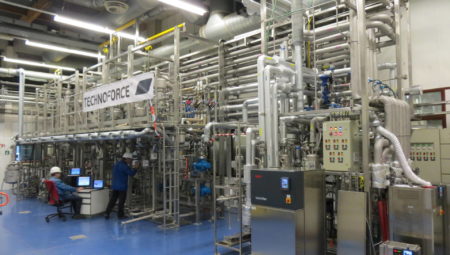Syngip is the brainchild of Bernhard Guentner and a continuation of Guentner’s PhD-thesis at the Fraunhofer Institute in Germany. ‘The idea was to find artificial, metabolic pathways for carboxydotrophic bacteria to manufacture certain chemicals from waste gases, such as isoprene or isobutene. In nature these bacteria do not perform these tasks. They have to be genetically engineered or ‘trained’ to produce these chemicals, preferably in the most efficient way.’ By incorporating genetic material from other organisms such as enzymes from yeasts, Syngip is able to produce and further optimize these strains. For now, the company has identified isobutene, isoprene, butadiene and propylene as targets. ‘The latter three are in the early development stage, while isobutene is in a more advanced stage, with titers which are approaching industry standards.’
Large market
These titers should be higher than 100 grams pure product per liter reactor volume, Guentner says. Syngip is getting there with isobutene, but more work in the lab is needed to perfect the specific strain. Also, the process needs to be scaled up. ‘Bacterial fermentation of syngas (CO and/or CO2, H2) is already taking place on an industrial scale (by Lanzatech, ethanol). Having said that, we need to experience in a 10 to 100-litre pilot setting if the process works. Momentarily, we are cooperating with a Belgian and a Swiss company and investigating the possibility of setting up a pilot plant together.’
Ethanol fermentation from syngas is a trick the industry has already mastered, Guentner says. The production of isobutene would be more profitable, given the price level and the sheer market volume. ‘It’s a global market of around 30 billion dollars annually. Isobutene is being used in various products, such as an intermediate in the production of various products, such as rubber or MTBE (methyl tert-butyl ether), a fuel additive which raises the octane level (to prevent engine knocking, red.).’
No problem
In order to compete with petroleum-based isobutene, the syngas-based isobutene needs to be price-competitive. ‘Even with record-low price levels even under 30 dollars per barrel crude oil, this won’t be problematic’, Guentner says. ‘However, we don’t know what the situation will be in two to three years. I expect that the oil price will fluctuate between 30 to 50 dollars per barrel. The price level of our isobutene will be roughly 100 euro per tonne (roughly ten times cheaper than fossil-based isobutene, ed.). Admittedly, this is a rough guess as the optimisation of the strain is still an ongoing process and upscaling needs to take place. There will be definitely a price advantage in terms of feedstock costs as ours are negative. These are gases which we need to get rid of. Furthermore, the production process will be cost-friendly as the end product is gaseous, which means that it is relatively easy to purify, compared to liquid solutions. All in all, we have a technology nobody in the industry has. Everybody can ferment ethanol, but we are – as far as I know – the only company to ferment isobutene from syngas.’
Guentner, born and raised in Germany, opened office on Chemelot Campus in 2015. Why his move to the Netherlands? ‘I am living in the Netherlands, in Vaals, just on the border. When I was looking for office/labspace, Chemelot Campus is the nearest and the best option because of the technical, legal and support infrastructure. Furthermore, it is easier and more attractive, compared to my home country, to start up a business in the Netherlands.’



